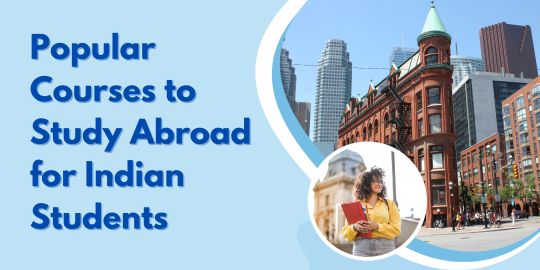Text
Discover the 5 Best Courses to Study Abroad in 2024

Studying abroad can be an exciting and life-changing experience, opening up new opportunities and perspectives. With 2024 upon us, let's dive into the five best courses to consider for Study abroad:
Global Business Management: In today's interconnected world, understanding global markets and business practices is invaluable. Courses in global business management offer insights into international trade, finance, and marketing strategies. With the rise of multinational corporations and global economic integration, this field is in high demand.
Environmental Science and Sustainability: As concerns about climate change and environmental degradation grow, so does the need for professionals in environmental science and sustainability. Studying abroad in this field provides opportunities to explore diverse ecosystems, learn about conservation efforts, and engage in hands-on research to address pressing environmental challenges.
Data Science and Analytics: In the era of big data, proficiency in data science and analytics is highly sought after across industries. Studying abroad in this field offers access to cutting-edge technologies and methodologies, as well as collaboration with leading experts. From predictive modeling to machine learning, the possibilities are endless in data-driven decision-making.
Healthcare Management and Public Health: The COVID-19 pandemic has underscored the importance of healthcare management and public health initiatives. Studying abroad in this field allows students to examine healthcare systems from a global perspective, explore public health interventions, and contribute to improving healthcare outcomes worldwide.
Renewable Energy Engineering: With growing concerns about fossil fuel dependency and climate change, renewable energy engineering is a field with immense potential for impact. Studying abroad in this field offers exposure to innovative technologies such as solar, wind, and hydroelectric power, as well as opportunities to collaborate on sustainable energy projects.
When considering which course to pursue abroad, it's essential to research the program's curriculum, faculty expertise, and opportunities for internships or practical experience. Additionally, think about how studying abroad in a particular field aligns with your long-term career goals and personal interests.
Overall, Study abroad can be a transformative experience, and choosing the right course is the first step towards an enriching academic journey. Whether you're passionate about business, environmental conservation, data science, healthcare, or renewable energy, there's a world of opportunities awaiting you in 2024 and beyond.
0 notes
Text
Popular Courses to Study Abroad for Indian Students

Studying abroad is an adventure that opens doors to new experiences, cultures, and opportunities. For Indian students, the prospect of pursuing education overseas is not just about gaining knowledge but also about exploring diverse environments and broadening horizons. Here are some popular courses that Indian students often choose to Study abroad:
Engineering and Technology: India is known for producing brilliant engineers, and studying engineering abroad enhances skills and offers exposure to cutting-edge technologies. Fields like computer science, electrical engineering, mechanical engineering, and civil engineering are highly sought after.
Business and Management: Pursuing a degree in business or management overseas is a pathway to global career opportunities. Courses such as business administration, finance, marketing, and international business provide students with valuable insights into the global economy and business practices.
Medicine and Healthcare: Many Indian students aspire to become doctors or healthcare professionals. Studying medicine abroad offers access to world-class education, advanced medical facilities, and exposure to diverse medical practices. Popular choices include general medicine, dentistry, pharmacy, nursing, and public health.
Information Technology (IT) and Computer Science: With the rapid advancements in technology, IT and computer science courses are in high demand. Studying abroad in this field offers access to top-notch research facilities, industry internships, and exposure to the latest trends such as artificial intelligence, cybersecurity, and data science.
Finance and Accounting: Finance and accounting are crucial sectors in the global economy. Studying these subjects abroad provides students with comprehensive knowledge of financial markets, investment strategies, and accounting principles. Many universities offer specialized courses like financial engineering, risk management, and corporate finance.
Hospitality and Tourism: For those interested in the hospitality industry, studying abroad offers a wealth of opportunities. Courses in hospitality management, tourism, hotel administration, and event management provide practical skills and hands-on experience in catering to diverse clientele from around the world.
Creative Arts and Design: Students with a passion for creativity often pursue courses in fine arts, graphic design, fashion design, interior design, and multimedia. Studying abroad in these fields allows students to explore different artistic styles, techniques, and cultural influences, fostering creativity and innovation.
Environmental Science and Sustainability: With growing concerns about climate change and environmental degradation, courses in environmental science, sustainability, and renewable energy are gaining popularity. Studying abroad provides students with opportunities to engage in research, fieldwork, and sustainable development projects.
Psychology and Social Sciences: Understanding human behavior and society is essential in today's interconnected world. Courses in psychology, sociology, anthropology, and political science offer insights into diverse cultures, societal norms, and global issues, preparing students for careers in counseling, research, advocacy, and policymaking.
Language and Literature: Studying languages and literature abroad offers a deep understanding of different cultures, histories, and literary traditions. Courses in linguistics, literature, translation, and cultural studies provide students with linguistic proficiency and intercultural competence, valuable assets in today's multicultural world.
These are just a few of the popular courses that Indian students can explore when considering Study abroad. Each course offers unique opportunities for personal growth, academic excellence, and career advancement. With proper research and planning, Indian students can embark on a transformative educational journey that will shape their future success.
#study abroad programs#study abroad#abroad education#Canada#university#college#international students
0 notes
Text
Take the Smartest Route to Study Abroad

Studying abroad can be a fantastic adventure, but it's important to plan wisely to make the most of your experience. Whether you're dreaming of sipping espresso in Italy or practicing your Mandarin in China, here's how to take the smartest route to Study abroad.
Research, Research, Research: Before you pack your bags, spend some time researching your destination. Learn about the culture, language, climate, and academic opportunities. Understanding what to expect will help you prepare mentally and emotionally for your adventure.
Choose the Right Program: There are many study abroad programs out there, so take your time to find the one that best suits your needs and interests. Consider factors like program length, academic focus, housing options, and support services for international students.
Financial Planning: Studying abroad can be expensive, but with careful financial planning, it's possible to make it affordable. Research scholarships, grants, and other funding opportunities. Create a budget for your time abroad and stick to it to avoid running out of money halfway through your trip.
Learn the Language: If you're studying in a non-English speaking country, take the time to learn the local language. Even basic language skills can make a big difference in your ability to navigate daily life and connect with locals.
Stay Safe: While studying abroad can be exciting, it's important to prioritize your safety. Familiarize yourself with local laws and customs, avoid risky situations, and always keep your valuables secure.
Immerse Yourself: One of the best ways to make the most of your study abroad experience is to immerse yourself in the local culture. Try new foods, explore off-the-beaten-path destinations, and make an effort to connect with locals.
Stay Connected: While it's important to immerse yourself in your host country, don't forget to stay connected with friends and family back home. Regular communication can help ease homesickness and keep your loved ones updated on your adventures.
Document Your Experience: Take plenty of photos, keep a journal, or start a blog to document your study abroad experience. Not only will this help you preserve memories, but it can also be a valuable resource for future trips or for sharing your experience with others.
By following these tips, you can take the smartest route to Study abroad and make the most of this life-changing experience. So go ahead, pack your bags, and get ready for the adventure of a lifetime!
0 notes
Text
Best Courses To Study Abroad For Indian Students

Studying abroad is a dream for many Indian students. It opens up a world of opportunities, exposure, and personal growth. However, choosing the right course is crucial for a successful academic and professional journey. Here's a guide to some of the best courses for Indian students to Study abroad, presented in simple language for easy understanding:
Engineering: Engineering remains one of the most sought-after fields for Indian students. Whether it's computer science, mechanical, electrical, or civil engineering, universities abroad offer top-notch programs with cutting-edge curriculum and research opportunities. Countries like the United States, Canada, Germany, and Australia are renowned for their engineering schools.
Business Administration (MBA): Pursuing an MBA abroad can significantly enhance career prospects. Indian students can choose from a variety of specializations such as finance, marketing, human resources, and entrepreneurship. Business schools in countries like the UK, USA, Canada, and Singapore are globally recognized for their rigorous academic standards and strong industry connections.
Medicine and Healthcare: Aspiring doctors and healthcare professionals can benefit from studying abroad, gaining exposure to diverse medical practices and cutting-edge research. Countries like the USA, UK, Australia, and New Zealand offer world-class medical education with opportunities for clinical experience and internships in leading hospitals.
Computer Science and Information Technology: With the rapid advancement of technology, computer science and IT courses abroad are in high demand. Indian students can explore programs in artificial intelligence, cybersecurity, data science, and software engineering. Universities in the USA, Canada, UK, and Germany are at the forefront of innovation in this field.
Finance and Economics: For those interested in finance, economics, and accounting, studying abroad can provide a global perspective and valuable insights into international markets. Leading universities in the USA, UK, Switzerland, and Singapore offer comprehensive programs with opportunities for internships in financial institutions and multinational corporations.
Hospitality and Tourism Management: With the booming hospitality industry worldwide, studying abroad in countries like Switzerland, Australia, USA, or Singapore can provide Indian students with hands-on experience in hotel management, event planning, and tourism marketing.
Environmental Science and Sustainability: As environmental issues gain global attention, studying abroad in countries like Sweden, Canada, Netherlands, or Denmark can offer Indian students specialized programs in environmental science, renewable energy, conservation, and sustainable development.
Media and Communication: For creative minds interested in media, journalism, film studies, or communication, studying abroad can provide exposure to diverse cultures and media landscapes. Countries like the USA, UK, Australia, and Canada offer vibrant programs with opportunities for internships in renowned media organizations.
International Relations and Political Science: With increasing globalization and geopolitical complexities, studying international relations or political science abroad can provide valuable insights into global affairs. Universities in the USA, UK, Germany, and France offer comprehensive programs with opportunities for internships in diplomatic missions and international organizations.
Arts and Humanities: For students passionate about literature, history, philosophy, or the arts, studying abroad can offer exposure to rich cultural traditions and academic excellence. Countries like the UK, USA, Italy, and France boast renowned universities with world-class faculty and resources in the humanities.
Before choosing a course and university Study abroad, Indian students should thoroughly research their options, considering factors such as academic reputation, faculty expertise, tuition fees, scholarships, location, and career prospects. Additionally, seeking guidance from education consultants, alumni, and current students can provide valuable insights and assistance throughout the application process.
Studying abroad is not just about acquiring knowledge; it's a transformative experience that broadens horizons, fosters independence, and builds lifelong connections. With the right course and determination, Indian students can embark on a rewarding academic journey abroad, fulfilling their aspirations and shaping their future success.
0 notes
Text
5 Ways to Study Abroad for Free or Cheap

Studying abroad is a dream for many students, but the cost can sometimes feel like a barrier. However, with a bit of creativity and resourcefulness, there are ways to make it happen without breaking the bank. Here are five simple ways to Study abroad for free or cheap:
Scholarships and Grants: Many organizations, universities, and governments offer scholarships and grants specifically for students who want to study abroad. These can cover tuition fees, living expenses, or both. Spend some time researching available scholarships and apply to as many as you can. Even small awards can add up and make a significant difference in funding your study abroad experience.
Exchange Programs: Look for exchange programs offered by your home institution or through partnerships with other universities abroad. These programs often allow you to study at a foreign university for a semester or year while paying the same tuition fees you would at your home institution. Additionally, some exchange programs include benefits like housing assistance or stipends to help cover living expenses.
Work-Study Programs: Some countries offer work-study programs that allow international students to work part-time while studying. These jobs can help offset living expenses and provide valuable work experience. Look into the visa regulations and employment opportunities for international students in your desired study destination to see if this option is available to you.
Teaching Assistantships or Language Assistant Programs: If you're proficient in a second language, consider applying for teaching assistantships or language assistant programs abroad. These positions often come with benefits such as a stipend, housing allowance, or even free tuition. In exchange, you'll assist local teachers in language classrooms or conduct language conversation sessions with students, gaining valuable teaching experience while immersing yourself in a new culture.
Crowdfunding and Fundraising: Get creative and harness the power of crowdfunding platforms to raise funds for your Study abroad journey. Share your story, goals, and aspirations with friends, family, and even strangers who may be willing to support your cause. You can offer incentives like personalized postcards from your study destination or digital photo albums documenting your experiences abroad in exchange for donations. Every contribution, no matter how small, can bring you closer to your goal of studying abroad.
In conclusion, studying abroad doesn't have to be prohibitively expensive. By exploring these five options and combining them creatively, you can make your dream of studying in a foreign country a reality without draining your bank account. With determination, resourcefulness, and a little bit of luck, you can embark on an enriching academic and cultural adventure without worrying about the cost.
#Canada#study abroad#abroad education#canada education#college#university#international students#colleges#students#education#study abroad education
0 notes
Text
Discover the 10 Best Courses to Study Abroad in 2024

.
Studying abroad opens up a world of opportunities, allowing you to immerse yourself in new cultures while pursuing your academic interests. But with so many options available, it can be overwhelming to choose the right course. Don't worry! We've got you covered. Here are the top 10 courses to Study abroad in 2024:
Computer Science: In a world driven by technology, computer science remains one of the most sought-after fields. Study abroad programs in countries like the USA, UK, Canada, and Australia offer cutting-edge curriculum and access to leading tech companies.
Business Administration: Gain valuable insights into global business practices by studying abroad in renowned business schools across Europe and Asia. Develop essential skills in management, finance, and marketing while building a global network.
Medicine: Pursue your dream of becoming a doctor by studying medicine abroad. Countries like the UK, USA, and Australia provide world-class medical education with hands-on clinical experience and research opportunities.
Engineering: Whether it's mechanical, electrical, or civil engineering, studying abroad can provide exposure to innovative technologies and advanced research facilities. Consider destinations like Germany, Singapore, and Sweden for top-notch engineering programs.
Hospitality and Tourism Management: Explore the world while studying hospitality and tourism management in countries known for their vibrant tourism industries such as Switzerland, France, and Spain. Gain practical experience through internships in luxury hotels and resorts.
Environmental Science: With increasing concerns about climate change, studying environmental science abroad can lead to impactful careers in sustainability and conservation. Choose destinations like Norway, New Zealand, or Costa Rica for immersive fieldwork experiences.
International Relations: Understand global dynamics and diplomacy by studying international relations abroad. Universities in the USA, UK, and Switzerland offer comprehensive programs with opportunities for internships at international organizations.
Psychology: Delve into the complexities of the human mind by studying psychology abroad. Explore diverse perspectives and approaches in countries like the Netherlands, Canada, and Ireland, known for their progressive psychology programs.
Art and Design: Unleash your creativity by studying art and design abroad. Immerse yourself in cultural hubs like Italy, France, or Japan, where you can draw inspiration from rich artistic traditions and contemporary trends.
Language Studies: Mastering a foreign language opens doors to new cultures and career opportunities. Study languages like Spanish in Spain, French in France, or Mandarin in China for an immersive linguistic experience.
No matter your academic interests or career goals, Study abroad can be a life-changing experience. Research your options, consider your priorities, and embark on an unforgettable journey of learning and discovery in 2024!
0 notes
Text
Search Courses & Find Your Dream Study Abroad Program

Are you dreaming of studying abroad but feeling overwhelmed by the search for the perfect program? Don't worry, you're not alone! Finding the right Study abroad program can seem like a daunting task, but with the right approach, it can be an exciting and rewarding experience. Here's a simple guide to help you navigate through the process and find your dream study abroad program.
1. Determine Your Goals
First things first, take some time to think about what you hope to gain from your study abroad experience. Are you looking to immerse yourself in a new culture, learn a new language, or pursue academic interests in a specific field? Understanding your goals will help you narrow down your options and find a program that aligns with your aspirations.
2. Research Destinations
Once you have a clear idea of what you want to achieve, start researching potential destinations that offer programs matching your interests. Consider factors such as language, culture, climate, and cost of living. Explore different countries and regions to find the perfect fit for your study abroad adventure.
3. Explore Available Courses
Next, delve into the courses and academic opportunities offered by various institutions in your chosen destination. Look for programs that align with your academic interests and offer courses that will enhance your learning experience. Don't forget to consider practical aspects such as credit transferability and course prerequisites.
4. Check Program Requirements
Before you get too excited about a particular program, make sure you meet all the requirements. This may include academic prerequisites, language proficiency exams, and visa regulations. Be sure to check the application deadlines and any additional documentation needed to apply for your chosen program.
5. Seek Guidance
If you're feeling overwhelmed or unsure about where to start, don't hesitate to seek guidance from academic advisors, Study abroad offices, or peers who have experienced studying abroad. They can offer valuable insights and advice to help you make informed decisions and navigate the application process.
6. Compare Costs and Financial Aid Options
Studying abroad can be a significant financial investment, so it's essential to consider the costs associated with your chosen program. Compare tuition fees, accommodation expenses, and other living costs across different destinations. Explore financial aid options, scholarships, and grants available to international students to help alleviate the financial burden.
7. Apply and Prepare
Once you've found the perfect study abroad program, it's time to submit your application and start preparing for your adventure. Gather all the necessary documents, including transcripts, letters of recommendation, and a well-crafted personal statement. Take care of practical matters such as securing housing, obtaining health insurance, and arranging travel logistics.
8. Embrace the Experience
Congratulations! You've successfully found your dream study abroad program and are ready to embark on a life-changing journey. Embrace the experience with an open mind and a sense of adventure. Immerse yourself in the local culture, make new friends, and seize every opportunity to learn and grow both academically and personally.
Conclusion
Finding the perfect study abroad program may seem like a daunting task, but with careful research and planning, you can turn your dream into a reality. Follow these simple steps to navigate the process and discover the adventure of a lifetime. Whether you're eager to explore new cultures, advance your academic goals, or gain valuable life experiences, studying abroad offers endless opportunities for personal and intellectual growth. So what are you waiting for? Start your journey today and let the world become your classroom!
0 notes
Text
8 Simple Steps to Study Abroad: Planning and Eligibility Criteria Made Easy

Studying abroad can be an enriching experience, offering you the opportunity to immerse yourself in new cultures, gain valuable skills, and broaden your horizons. However, the process of planning and understanding eligibility criteria can seem daunting. Fear not! Here are eight easy steps to guide you through the process.
Research Destinations: Start by researching potential Study abroad destinations. Consider factors such as language, culture, climate, and academic reputation. Make a list of your top choices to narrow down your options.
Understand Program Requirements: Different study abroad programs may have varying eligibility criteria. Some may require a minimum GPA, language proficiency tests (such as TOEFL or IELTS), or specific prerequisite courses. Familiarize yourself with these requirements early on.
Consult with Your Academic Advisor: Schedule a meeting with your academic advisor to discuss your interest in studying abroad. They can provide valuable insights into how studying abroad fits into your academic plan and offer guidance on course selection and credit transfer.
Financial Planning: Determine the cost of studying abroad, including tuition, accommodation, travel expenses, and living costs. Explore scholarship opportunities, financial aid options, and consider creating a budget to manage your expenses while abroad.
Apply to Programs: Once you've chosen a destination and program that aligns with your academic and personal goals, it's time to apply. Be sure to submit all required documents, such as transcripts, letters of recommendation, and essays, before the deadline.
Obtain Necessary Documentation: Depending on your destination, you may need to obtain a student visa or residence permit. Research the visa application process for your chosen country and gather all required documents, such as proof of enrollment and financial stability.
Prepare for Cultural Adjustment: Studying abroad involves adapting to a new cultural environment. Take time to learn about the customs, traditions, and social norms of your host country. Consider participating in pre-departure orientation programs to better prepare for cultural differences.
Stay Organized and Flexible: As you embark on your study abroad journey, staying organized and flexible will be key. Keep track of important deadlines, travel arrangements, and academic responsibilities. Embrace new experiences with an open mind and be prepared to navigate unexpected challenges along the way.
Remember, Study abroad is not only about academic achievement but also personal growth and cultural exchange. By following these eight simple steps and staying proactive in your planning, you can embark on a rewarding study abroad experience that will shape your future in profound ways.
0 notes
Text
When is the Best Time to Study Abroad? Pros & Cons

Studying abroad is an exciting opportunity that opens doors to new experiences, cultures, and friendships. However, deciding when to embark on this adventure can be a tough decision. Is there a perfect time? Let's explore the pros and cons of different times to Study abroad to help you make the best choice.
1. Freshman or Sophomore Year:
Pros:
Early exposure: Studying abroad early in your college career allows you to explore different academic paths and discover your interests.
Longer integration time: You have more time to adapt to the new environment and build lasting relationships with locals and fellow students.
Opportunity for internships: Some programs offer internship opportunities, providing valuable work experience early on.
Cons:
Academic adjustment: Adapting to a new academic system and coursework might be challenging when you're still adjusting to college life.
Limited coursework options: As a freshman or sophomore, you might have fewer options for specialized courses abroad.
2. Junior Year:
Pros:
Academic maturity: By your junior year, you've likely settled into your major and can take advantage of more specialized courses abroad.
Independence: Junior year is a time when many students feel more confident navigating new environments and managing their studies independently.
Networking opportunities: You'll have the chance to network with professionals in your field through internships or research projects.
Cons:
Timing conflicts: Depending on your major requirements, studying abroad during your junior year might clash with essential courses back home.
Graduation timeline: If you plan to graduate on time, you'll need to ensure that the credits earned abroad align with your degree requirements.
3. Senior Year:
Pros:
Reflection and growth: Studying abroad in your senior year can be a culmination of your college experience, allowing for reflection and personal growth before entering the workforce.
Career preparation: International experience can enhance your resume and make you more attractive to employers seeking global-minded candidates.
Lasting memories: Senior year abroad can create unforgettable memories and friendships to cherish as you transition into the next phase of your life.
Cons:
Graduation pressures: Balancing graduation requirements with studying abroad can be stressful, especially if you're trying to complete remaining coursework or a thesis.
Post-graduation plans: If you have immediate post-graduation plans, such as job offers or graduate school commitments, studying abroad in your senior year might not be feasible.
Conclusion:
There's no one-size-fits-all answer to the question of when to Study abroad. Each stage of your college journey offers unique advantages and challenges. Ultimately, the best time to study abroad is when it aligns with your academic goals, personal interests, and future plans. Whether you choose to go abroad as a freshman, junior, or senior, seize the opportunity to embrace new experiences, broaden your horizons, and make memories that will last a lifetime.
0 notes
Text
Are Study Abroad Programs Hard to Get Into?

Studying abroad can be an exciting opportunity to explore new cultures, broaden your horizons, and gain valuable academic experience. But one question many students ask is: Are Study abroad programs hard to get into? Let's break it down in simple terms.
Firstly, it's essential to understand that the difficulty of getting into a study abroad program can vary depending on several factors:
Program Popularity: Some study abroad programs are more popular than others. For example, destinations like Paris, London, or Tokyo might receive more applications than programs in less well-known locations. So, if you're applying to a highly sought-after program, competition might be tougher.
Academic Requirements: Just like applying to your home university, study abroad programs often have academic criteria you need to meet. These could include a minimum GPA, specific courses completed, or language proficiency tests. Meeting these requirements is crucial to being considered for the program.
Application Process: The application process itself can vary in complexity. Some programs may require you to submit essays, letters of recommendation, or even attend interviews. It's essential to carefully follow all instructions and submit your application before the deadline.
Available Spots: Study abroad programs typically have a limited number of spots available. If a program is highly competitive and receives more applications than available spots, it can make getting accepted more challenging.
Financial Considerations: Cost can also be a factor. While some study abroad programs offer scholarships or financial aid, others may require you to cover the expenses yourself. Ensuring you have the necessary funds to support your studies abroad is important.
So, are study abroad programs hard to get into? The answer is, it depends. Some programs might be more competitive than others, but with careful planning, preparation, and meeting the requirements, you can increase your chances of being accepted.
Here are some tips to improve your chances:
Start Early: Research different study abroad programs well in advance and start preparing your application early to give yourself plenty of time.
Focus on Academics: Maintain a good GPA and ensure you meet any academic requirements set by the program.
Write a Strong Application: Take the time to craft a compelling application, including well-written essays and letters of recommendation that showcase your strengths and motivations.
Be Flexible: Consider applying to multiple programs or alternative destinations to increase your options.
Seek Support: Don't hesitate to reach out to your university's study abroad office or academic advisors for guidance and support throughout the application process.
In conclusion, while study abroad programs can be competitive, with careful planning and preparation, you can increase your chances of being accepted. Don't let the challenge deter you from pursuing this enriching experience!
#study abroad#abroad education#Canada#education#canada education#college#indian students#international students
0 notes
Text
Study Abroad Course Eligibility: Application Process & Requirements

Studying abroad can be an exciting opportunity to explore new cultures, gain valuable education, and broaden your horizons. However, before embarking on this journey, it's crucial to understand the eligibility criteria, application process, and requirements. In this guide, we'll break down everything you need to know in simple terms, ensuring a smooth and successful application process.
Understanding Eligibility Criteria
Academic Requirements:
Most Study abroad programs require a minimum level of academic achievement for eligibility. This typically includes a certain GPA (Grade Point Average) or equivalent scores from standardized tests like the SAT, ACT, or language proficiency tests such as the TOEFL or IELTS.
Language Proficiency:
Since you'll be studying in a foreign country, proficiency in the language of instruction is often necessary. Many universities and programs require applicants to demonstrate their language proficiency through standardized tests or other assessments.
Financial Considerations:
Studying abroad can be costly, and universities often require proof of sufficient funds to cover tuition fees, living expenses, and other miscellaneous costs. This could involve providing bank statements, scholarship awards, or financial aid documentation.
Visa and Legal Requirements:
International students typically need a student visa to study abroad. Each country has its own visa requirements and application procedures, so it's essential to research and fulfill all necessary documentation, including health insurance and proof of accommodation.
The Application Process
Research and Shortlist:
Start by researching universities and programs that align with your academic goals and personal preferences. Consider factors such as location, program offerings, reputation, and cost.
Prepare Application Materials:
Gather all necessary documents, including transcripts, standardized test scores, letters of recommendation, a personal statement or essay, and any additional requirements specified by the universities or programs you're applying to.
Submit Applications:
Follow the application guidelines provided by each university or program carefully. Submit your applications before the specified deadlines, keeping track of any supplementary materials or fees required.
Await Responses:
After submitting your applications, patiently await responses from the universities or programs. This may take several weeks or months, so remain proactive and attentive to any communication from the admissions offices.
Tips for Success
Start the application process early to allow ample time for gathering documents, completing requirements, and resolving any issues that may arise.
Tailor your personal statement or essay to each university or program, highlighting your unique qualities, experiences, and aspirations.
Seek guidance from academic advisors, mentors, or alumni who have experience with the study abroad application process.
Double-check all application materials for accuracy and completeness before submission to avoid any delays or complications.
Conclusion
Study abroad offers a world of opportunities for personal and academic growth, but it requires careful planning and preparation. By understanding the eligibility criteria, navigating the application process, and following these tips for success, you can embark on your study abroad journey with confidence. Remember to stay organized, proactive, and resilient throughout the application process, and you'll be one step closer to realizing your dreams of studying abroad.
#study abroad scholarship#abroad study#study abroad#abroad education#college#university#international students
0 notes
Text
Why do Indian Students Prefer Pursuing Higher Studies Abroad?

India boasts a vibrant education system, but many students set their sights on universities overseas. Why the international appeal? Let's explore the top reasons why Indian students choose to fly the coop for their higher studies.
Top-Notch Education: Indian universities are on the rise, but there's a perception that established foreign institutions offer a certain edge. These universities often have a long history of academic excellence, with renowned professors, cutting-edge facilities, and curricula that are constantly evolving. This can be a major draw for students seeking the best possible education in their chosen field.
Course Variety and Specialization: Indian universities may have a set curriculum, while universities Study abroad often provide a wider range of subjects and specializations. This allows students to delve deeper into their interests and even explore unconventional fields. Imagine studying Robotics Engineering or Animation – these might be easier to find abroad.
Global Exposure and Independence: Studying abroad is an adventure! Students get to experience new cultures, broaden their horizons, and develop a more global perspective. Living in a different country fosters independence and self-reliance as students navigate unfamiliar territory. They learn to adapt, solve problems on their own, and build confidence.
Career Opportunities and Recognition: A degree from a prestigious foreign university can open doors to exciting job prospects, both in India and abroad. International qualifications are often viewed favorably by employers, giving graduates a competitive edge in the job market. They might also command higher salaries due to the perception of a well-rounded skillset gained from a global education.
The Allure of Research and Innovation: Many universities abroad are hubs for groundbreaking research. For students passionate about pushing boundaries, being part of this environment can be incredibly stimulating. They get firsthand exposure to cutting-edge projects and have the opportunity to contribute to meaningful research alongside world-class faculty.
Scholarship Support: The high cost of international education is a concern, but there are scholarships available from universities, governments, and private organizations. These scholarships can significantly ease the financial burden, making study abroad a more realistic possibility for deserving students.
Quality of Life: While this varies by country, some students might be drawn to a higher standard of living abroad. This could include better infrastructure, access to advanced technologies, or a more relaxed pace of life.
Building a Network: Universities abroad often have strong alumni networks. By studying abroad, students can connect with successful professionals in their field, opening doors to future opportunities like internships or even mentorship programs.
It's Not All Sunshine and Rainbows: Studying abroad comes with its own set of challenges. Students have to adapt to a new culture, navigate unfamiliar bureaucracies, and sometimes deal with loneliness. Being far from family and friends can be tough. But these challenges can also be valuable learning experiences, fostering resilience and adaptability.
The Final Takeaway:
The decision to Study abroad is a personal one. While India has a lot to offer, there are undeniable advantages to gaining an international education. From world-class facilities to global exposure, studying abroad can equip students with the knowledge, skills, and experiences they need to thrive in an increasingly interconnected world. It's an investment in their future, both personally and professionally.
0 notes
Text
Take the Smartest Route to Study Abroad: Tips for Success

Study abroad can be an exciting adventure, but it requires some planning to make sure you're on the right track. Whether you're dreaming of sipping coffee in a quaint European café or exploring ancient temples in Asia, taking the smartest route can make all the difference. Here are some simple yet effective tips to help you on your journey:
Do Your Research: Before diving into any plans, take the time to research your options. Look into different countries, universities, and programs that align with your interests and academic goals. Consider factors like language barriers, cost of living, and cultural differences.
Start Early: Don't wait until the last minute to start the application process. Many universities abroad have deadlines that are months in advance, so give yourself plenty of time to gather documents, write essays, and meet requirements.
Seek Guidance: Don't be afraid to ask for help! Reach out to your school's guidance counselor or study abroad office for advice and resources. They can provide valuable insights and help you navigate the application process.
Budget Wisely: Studying abroad can be expensive, so it's important to budget wisely. Research the cost of tuition, housing, food, transportation, and other expenses in your chosen destination. Look into scholarships, grants, and financial aid options to help offset costs.
Learn the Language: If you're studying in a country where English isn't the primary language, consider taking language classes beforehand. Being able to communicate in the local language will not only enhance your experience but also make it easier to navigate daily life.
Immerse Yourself: Once you arrive in your host country, immerse yourself in the culture. Try new foods, explore local attractions, and make an effort to connect with locals. Embracing the culture will enrich your experience and help you make the most of your time abroad.
Stay Safe: While studying abroad is an exciting adventure, it's important to prioritize your safety. Familiarize yourself with local laws and customs, avoid risky situations, and always have a backup plan in case of emergencies.
Stay Connected: Keep in touch with friends and family back home, but also make an effort to build new relationships abroad. Join clubs, attend events, and participate in cultural activities to meet new people and create lasting memories.
Document Your Journey: Take plenty of photos, journal about your experiences, and collect mementos to remember your time abroad. Documenting your journey will allow you to look back fondly on your adventures and share them with others.
Be Open-Minded: Finally, approach studying abroad with an open mind and a sense of curiosity. Embrace new experiences, step out of your comfort zone, and allow yourself to grow both academically and personally.
By taking the smartest route to Study abroad, you can embark on an unforgettable journey filled with learning, adventure, and personal growth. So pack your bags, prepare for the unknown, and get ready to explore the world!
0 notes
Text
7 reasons why studying abroad will change your life

Studying abroad can be one of the most exciting and transformative experiences of your life. It's not just about hitting the books in a foreign land; it's about immersing yourself in a new culture, making lifelong friends, and gaining valuable life skills. If you're still on the fence about whether study abroad is worth it, here are seven reasons why it can completely change your life:
Cultural Immersion: When you study abroad, you're not just visiting another country – you're living there. You'll have the opportunity to immerse yourself in a new culture, try new foods, learn a new language, and experience traditions that you never knew existed. This cultural immersion can broaden your perspective and make you more open-minded and understanding of different ways of life.
Independence: Moving to a new country to study requires a lot of independence and self-reliance. You'll have to navigate unfamiliar surroundings, manage your own finances, and handle day-to-day tasks without the support of friends and family back home. This newfound independence will help you grow as a person and become more self-confident.
Global Network: Studying abroad exposes you to a diverse group of people from all over the world. You'll have the opportunity to make friends with fellow students from different backgrounds and cultures, as well as connect with professors and professionals in your field of study. These connections can open doors for future collaborations, career opportunities, and friendships that last a lifetime.
Personal Growth: Living in a foreign country challenges you to step out of your comfort zone and adapt to new situations. Whether it's figuring out public transportation, navigating cultural differences, or overcoming language barriers, studying abroad forces you to grow and become more resilient. You'll become more self-aware, resourceful, and adaptable – qualities that are invaluable in both your personal and professional life.
Academic Enrichment: Studying abroad gives you the opportunity to learn from top universities and experts in your field. You'll have access to cutting-edge research facilities, innovative teaching methods, and a different academic perspective that can enhance your learning experience. Plus, studying in a new environment can spark creativity and inspire new ideas that you wouldn't have encountered otherwise.
Career Advancement: Employers value the skills and experiences gained from studying abroad. It demonstrates that you're adaptable, culturally aware, and able to thrive in diverse environments – all qualities that are highly sought after in today's globalized workforce. Whether you're pursuing an international career or not, studying abroad can give you a competitive edge in the job market and increase your employability.
Life-long Memories: Last but not least, studying abroad is an experience you'll never forget. From exploring iconic landmarks to participating in cultural festivals to forming deep friendships with people from around the world, the memories you create during your time abroad will stay with you forever. These experiences will enrich your life and provide you with stories to share for years to come.
In conclusion, study abroad is more than just an academic experience – it's a life-changing journey that will broaden your horizons, challenge you to grow, and create memories that last a lifetime. If you have the opportunity to study abroad, seize it with both hands – you won't regret it.
0 notes
Text
9 Best Study Abroad Programs in 2024

Studying abroad is an exciting opportunity to immerse yourself in a new culture, gain valuable experiences, and broaden your horizons. With countless options available, choosing the right study abroad program can be overwhelming. To make things easier for you, we've compiled a list of the 9 best study abroad programs in 2024 that offer exceptional educational experiences and unforgettable adventures.
ISEP Exchange Program: The ISEP Exchange Program provides students with the opportunity to study at universities in over 50 countries worldwide. With a wide range of academic disciplines and affordable tuition fees, ISEP offers students the chance to fully integrate into the local culture and academic community.
CIEE Study Abroad: CIEE offers a diverse range of study abroad programs in over 40 countries. Whether you're interested in studying language, culture, business, or environmental science, CIEE provides immersive experiences that foster personal and academic growth.
IES Abroad: IES Abroad offers semester and year-long study abroad programs in over 20 locations around the world. With courses taught in English and opportunities for internships and fieldwork, IES Abroad provides students with hands-on learning experiences in vibrant cultural settings.
SIT Study Abroad: SIT Study Abroad focuses on experiential learning and cultural immersion. With programs in more than 30 countries, SIT offers unique opportunities for students to engage with local communities, conduct research, and explore pressing global issues.
ISA Study Abroad: ISA Study Abroad offers programs in over 30 countries, with a variety of academic disciplines and program durations to choose from. From language immersion programs to internships and service-learning opportunities, ISA provides students with tailored experiences to suit their interests and goals.
AIFS Study Abroad: AIFS Study Abroad offers programs in Europe, Asia, Africa, and the Americas. With a focus on academic rigor and cultural immersion, AIFS provides students with the support they need to succeed academically while exploring new cultures and environments.
API Study Abroad: API Study Abroad offers programs in over 20 countries, with a wide range of academic disciplines and program options available. From semester programs to short-term summer sessions, API provides students with flexible opportunities to study and explore abroad.
CEA Study Abroad: CEA Study Abroad offers programs in over 20 cities around the world, with a focus on academic excellence and cultural immersion. With courses taught in English and opportunities for internships and service-learning, CEA provides students with transformative experiences that prepare them for success in a globalized world.
Study Abroad through Your University: Many universities offer their own study abroad programs, allowing students to earn credits towards their degree while experiencing life in another country. Check with your university's study abroad office to explore the options available to you.
No matter which study abroad program you choose, the experience is sure to be transformative and rewarding. Take the leap, explore the world, and embark on an unforgettable journey of learning and discovery!
0 notes
Text
Study Abroad Checklist: What You Need to Know Before You Go

Are you getting ready to embark on a study abroad adventure? It's an exciting time full of new experiences and opportunities, but it's essential to make sure you're prepared. Having a checklist can help ensure that you don't forget anything important before you go. Here's what you should include:
Passport and Visa: First things first, make sure your passport is up-to-date and won't expire while you're away. You'll also need to check if you need a visa for the country you're going to. Getting these sorted out early is crucial, so you're not scrambling at the last minute.
Travel Insurance: It's always a good idea to have travel insurance. This can help protect you in case of any unexpected emergencies, like medical issues or trip cancellations. Make sure to read the policy carefully to understand what is covered.
Finances: Take care of your finances before you leave. Notify your bank that you'll be abroad so they don't freeze your account for suspicious activity. Look into currency exchange options and figure out how you'll access your money while you're away.
Accommodation: Make sure your housing arrangements are sorted out well in advance. Whether you're staying in a dormitory, apartment, or with a host family, confirm your accommodations and get any necessary paperwork or agreements in order.
Health and Safety: Research any health and safety concerns in your destination country. Make sure you're up to date on vaccinations and stock up on any necessary medications. It's also a good idea to familiarize yourself with local laws and customs.
Packing Essentials: Pack light, but don't forget the essentials. This includes clothing appropriate for the climate, toiletries, any necessary electronics and chargers, and any specialized items you might need for your studies or hobbies.
Important Documents: Keep all your important documents organized and easily accessible. This includes your passport, visa, travel insurance information, and any documentation related to your studies, such as acceptance letters or enrollment forms.
Emergency Contacts: Make a list of emergency contacts, both at home and in your destination country. This should include family members, friends, your home country's embassy or consulate, and any local contacts provided by your study abroad program.
Cultural Preparation: Take some time to learn about the culture and customs of your destination country. This can help you avoid cultural faux pas and make a good impression on the locals.
Study Materials: Don't forget the reason you're going abroad in the first place – to study! Make sure you have all the necessary materials for your classes, including textbooks, notebooks, and any specialized equipment.
Communication: Figure out how you'll stay in touch with friends and family back home. This might include setting up a phone plan with international coverage, using messaging apps, or scheduling regular video calls.
Exploration Plans: While studying abroad is primarily about academics, it's also an opportunity to explore a new country and culture. Make a list of places you want to visit and experiences you want to have while you're abroad.
By including these items on your study abroad checklist, you can ensure that you're well-prepared for your adventure. Remember to stay organized, stay safe, and most importantly, have fun!
0 notes
Text
Cost of Studying Abroad for Indian Students in Rupees

Studying abroad is a dream for many Indian students, but the financial aspect can often seem daunting. From tuition fees to living expenses, there are several factors to consider when calculating the cost of study abroad overseas. In this article, we'll break down the expenses involved and provide an estimate in Indian rupees to help you plan better for your academic journey abroad.
Tuition Fees: Tuition fees vary greatly depending on the country, university, and course you choose. For instance, studying in the United States or the United Kingdom tends to be more expensive compared to countries like Germany or Canada. On average, undergraduate courses can range from ₹10 lakhs to ₹40 lakhs per year, while postgraduate courses may cost between ₹12 lakhs to ₹50 lakhs per year.
Accommodation: Living expenses, including accommodation, can significantly impact your budget. The cost of accommodation varies based on factors such as location, type of accommodation (dormitory, shared apartment, or private rental), and amenities provided. In popular student destinations like the UK or Australia, monthly rent can range from ₹30,000 to ₹80,000, while in countries like Germany or Canada, it may be slightly lower, ranging from ₹20,000 to ₹60,000 per month.
Food and Daily Expenses: Food expenses depend on your lifestyle and dietary preferences. Eating out frequently or opting for groceries and cooking at home can affect your monthly budget. On average, students may spend between ₹15,000 to ₹30,000 per month on food and daily expenses, including transportation, utilities, and leisure activities.
Health Insurance: Health insurance is mandatory for international students in many countries. The cost varies depending on the coverage and duration of the policy. In general, health insurance for students abroad can cost between ₹20,000 to ₹50,000 per year.
Travel Expenses: Travel expenses include airfare, visa fees, and other related costs. The price of airline tickets fluctuates based on the time of booking, airline, and destination. Visa fees also vary depending on the country you're applying to. On average, students may need to allocate between ₹50,000 to ₹1,50,000 for travel expenses.
Miscellaneous Expenses: Miscellaneous expenses include textbooks, study materials, visa application fees, and other unforeseen costs. While these expenses may not be as significant as tuition or accommodation, they can add up over time. It's advisable to budget an additional ₹50,000 to ₹1,00,000 for miscellaneous expenses.
When tallying up the total cost of studying abroad, it's essential to factor in currency exchange rates and inflation, which can affect the overall expenses. Additionally, scholarships, grants, and part-time job opportunities can help alleviate some of the financial burdens associated with studying overseas.
In conclusion, study abroad can be a life-changing experience, but it's essential to plan your finances meticulously to ensure a smooth transition. By understanding the various expenses involved and budgeting wisely, you can make your dream of studying abroad a reality without breaking the bank.
0 notes